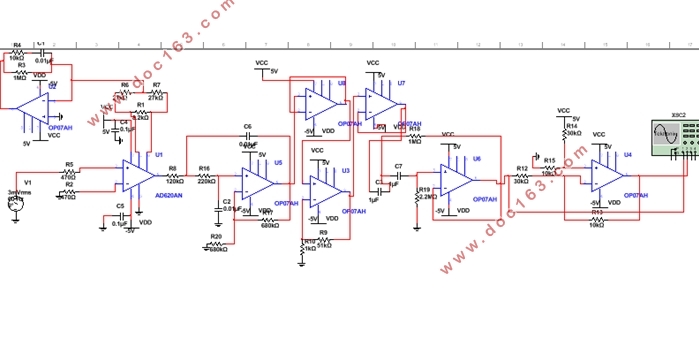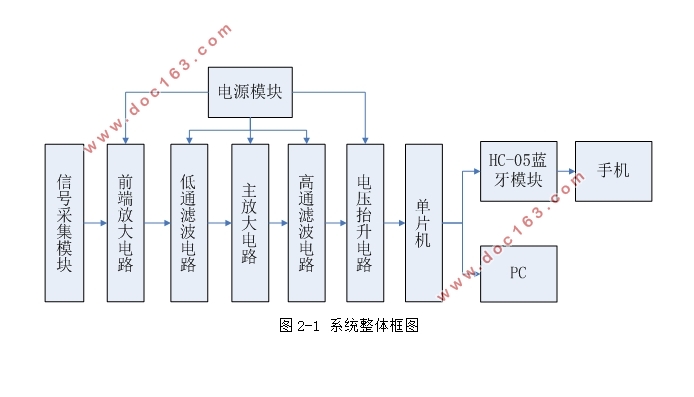基于STM32和Labview的心电仪设计

基于STM32和Labview的心电仪设计(论文10900字)
摘 要
心血管病的发病率和死亡率逐年增高,对于心脏病、心脑血管病等高危疾病的患者,不间断地监测健康状况极为重要。本次设计是基于Cortex-M3内核的信号采集,去噪和数据分析的系统,实现了人体心电信号的实时监控,不仅能够大幅度减少医疗消费支出,而且可以有效的优化个人健康管理服务。首先通过氯化银电极片采集人体肢体导联电压波形,利用二阶巴特沃斯滤波器滤除噪声,再经过模拟放大电路将信号放大1000倍,得到放大后的波形。利用STM32单片机实现片上IIR实时滤波消除50HZ的工频干扰和Savitzky-Golay平滑滤波。将采集完的数据通过蓝牙传输到安卓端上位机,用户可以通过手机实时观察自身心电波形,清楚的了解自身身体状况。同时通过串口将心电数据传输到PC端上位机,在Labview中进行特征提取与数据分析,以实现医生对病人的情况进行实时监控。
关键词:心电信号 滤波器 安卓 PC上位机 Labview
The design of electrocardiogram monitor based on STM32 MCU and Labview
Abstract
Cardiovascular morbidity and mortality increased year by year, for patients with heart disease, cardiovascular and cerebrovascular diseases, the continuous monitoring of health is very important.This design is based on Cortex-M3 kernel’s system,which can collect signal,denoise signal and analyze data.It achieves the real-time monitoring of human electrocardiogram signals,which can not only reduce medical expenditure greatly but improve the personal health care service. Firstly,human body lead voltage waveform collected by the Agcl electrode slice adopts second-order butterworth filters to filter out the noise.Then the signal is zoomed in 1000 times through the analog front-end so that it gets the waveform zoomed in. Meanwhile,Using STM32 MCU can realize IIR real-time filtering On the chip eliminating 50Hz power line interference and Savitzky-Golay smooth filter. The collection of data is sent to Android mobile phone via Bluetooth .Therefore mobile phone users can observe their ECG waveform in real-time so as to clearly understand user’s physical condition. At the same time, ECG data is transferred to PC terminal through serial interface.PC terminal extracts features and analyzes data came from patients with the labview 2014 environment in order that doctor can monitor in real-time patient's physical condition. [资料来源:www.doc163.com]
Key Words: ECG signal; filter; Android; PC; Labview


目 录
摘 要 I
Abstract II
第一章 绪论 1
1.1 研究意义 1
1.2 心电图基本知识 1
1.3 心电仪的发展 2
1.3.1 心电信号去噪处理的发展 2
1.3.2 心电信号的发展方向 2
1.4 论文主要内容 3
第二章 系统设计概述 4
2.1 系统功能和整体框图 4
2.1.1 心电监测系统的工作原理 4 [资料来源:Doc163.com]
2.2.2 心电仪的整体框图 4
2.2 系统方案选择 5
2.2.1 电源模块方案 5
2.2.2 信号采集方案 6
2.2.3 前端放大电路方案 6
2.2.4 滤波电路方案 6
2.2.5 单片机方案 7
2.3 小结 7
第三章 硬件系统设计 8
3.1 电源模块 8
3.2 信号采集模块 8
3.3 前端放大电路 9
3.4 低通滤波电路 10
3.5 主放大电路 11
3.6 高通滤波电路 11
3.7 电压抬升电路 12
3.8 STM32最小系统 13
3.9 蓝牙模块 14
3.10 小结 14
第四章 软件系统设计 15
4.1 下位机程序设计 15
[来源:http://www.doc163.com]
4.1.1 主函数 15
4.1.2 具体函数模块设计 16
4.2 Labview程序设计 19
4.2.1 总体流程图 19
4.2.2 各部分流程图 19
4.3 安卓程序设计 21
4.3.1 Android蓝牙通信中用到的类 21
4.3.2 Android客户端设计 22
4.4 小结 23
第五章 软件仿真设计 24
5.1 Multisim仿真 24
5.1.1 输入频率范围内信号 24
5.1.2 输入频率范围外信号 24
5.2 Matlab仿真 25
5.2.1 干扰来源 25
5.2.2 数字陷波滤波器的设计 25
5.2.4 采用SG平滑滤波算法对心电信号进行平滑处理 26
5.3 小结 27
第六章 系统调试、问题总结与实验结果 28 [来源:http://Doc163.com]
6.1 系统调试 28
6.1.1 下位机软件调试 28
6.1.2 上位机软件调试 28
6.1.3 硬件调试 30
6.2 问题总结 31
6.3 实验结果 31
6.3.1 原始心电图 31
6.3.2 消除噪声并进过平滑处理的心电图 32
6.3.3 心电数据特征分析 32
6.3.4 手机APP绘制心电图 33
6.4 小结 33
参考文献 34
致谢 36
附录一 电路原理图 37
附录二 心电仪实物图 38
附录三 手机显示界面 39
附录四 Multisim仿真图 40
[资料来源:http://Doc163.com]
